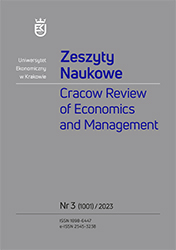Społecznie odpowiedzialne innowacje w gospodarce odpadami komunalnymi w mieście przyszłości
Socially Responsible Innovations in Municipal Waste Management in the City of the Future
Author(s): Józefa Famielec, Agata Lulewicz-Sas, Stanisław Famielec, Marcin ChełkowskiSubject(s): Environmental and Energy policy, Welfare systems, Applied Sociology, Management and complex organizations, Rural and urban sociology, Environmental interactions
Published by: Wydawnictwo Uniwersytetu Ekonomicznego w Krakowie
Keywords: socially responsible innovations; municipal waste; waste management hierarchy; selective waste collection; waste generation indicators;
Summary/Abstract: Objective: To define, identify and evaluate socially responsible innovations of municipal waste management in the city.Research Design & Methods: Socially responsible innovations were considered a condition and an opportunity to achieve municipal waste management goals and standards in cities. These include solutions that ensure a legally regulated, economically justified and socially acceptable hierarchy of waste management and, as a result, closing the material cycles in this economy. The theoretical background covers definitions of socially responsible innovations and the development of goals and standards in municipal waste management. The empirical basis comprises unpublished data on municipal waste management from a company working in Krakow and reports produced by the Mayor’s Office of the City of Krakow on the implementation of tasks in municipal waste management. Econometric (regression) and statistical methods for studying the dynamics of changes and the structure of the categories examined were used.Findings: In the period under consideration, the Municipality of Krakow achieved the legally required levels of recycling and preparation for reuse and recovery of some fractions of municipal waste. The income of the municipal waste management system per capita has a positive and statistically significant impact on the levels of preparation for reuse, recycling and recovery that were achieved.Implications / Recommendations: Innovative organisation and management as well as innovative methods of waste segregation and collection ensure that the goals and standards in municipal waste management will continue to be achieved.Contribution: The article contributes new knowledge on improving the productivity and efficiency of municipal waste management, the use and implementation of the “polluter pays” principle and improving the effectiveness of integrated municipal waste management systems.
Journal: Zeszyty Naukowe Uniwersytetu Ekonomicznego w Krakowie
- Issue Year: 1001/2023
- Issue No: 3
- Page Range: 123-143
- Page Count: 21
- Language: Polish

